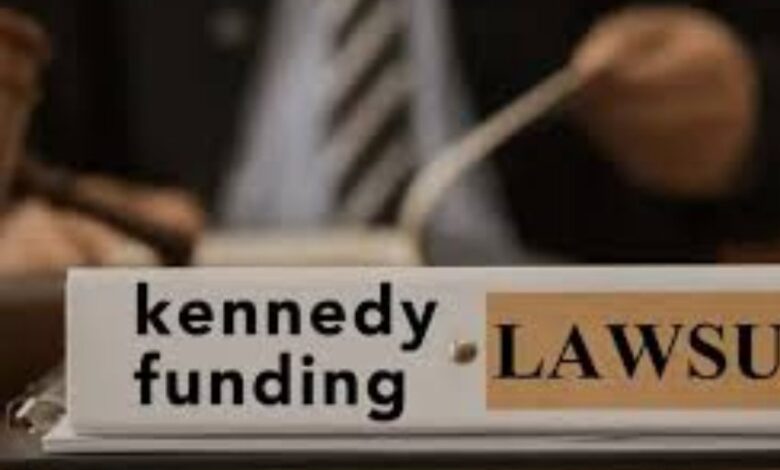Understanding the Kennedy Funding Lawsuit: A Complex Legal Battle

The Kennedy Funding lawsuit is a notable legal case that has captured the attention of many in the financial and lending industries. At its core, the lawsuit involves allegations of breach of contract, fraud, and unfair lending practices against Kennedy Funding Inc., a commercial lending firm based in New Jersey. The case has unfolded across various courts, with significant implications not just for the parties directly involved, but also for the broader commercial real estate financing landscape.
Background of the Kennedy Funding Lawsuit
The lawsuit centers around a series of transactions and agreements between Kennedy Funding Inc. and several of its clients, including Virgil Shelton, who emerged as one of the key plaintiffs. The disputes began when these clients accused Kennedy Funding of failing to adhere to the terms of their loan agreements. Key issues included allegations that Kennedy Funding misrepresented loan terms, imposed hidden fees, and engaged in predatory lending practices. These claims have been contested by Kennedy Funding, leading to a protracted legal battle with numerous twists and turns.
Key Allegations in the Kennedy Funding Lawsuit
Several allegations were brought forward against Kennedy Funding, each of which has played a critical role in shaping the lawsuit:
- Misleading Loan Terms: Plaintiffs, including a group of investors, alleged that Kennedy Funding provided incorrect or misleading information regarding the terms of their loans, such as interest rates, repayment schedules, and other critical details. This misrepresentation reportedly led to substantial financial losses for the borrowers who were unprepared for the unexpected conditions they encountered.
- Hidden Fees and Predatory Practices: Numerous complaints have surfaced regarding undisclosed fees that were not mentioned at the time of the loan agreement. Borrowers argued that these hidden costs resulted in severe financial strain, making it difficult for them to meet their obligations.
- Fraud and Misrepresentation: Accusations of fraud have been central to the lawsuit. Plaintiffs accused Kennedy Funding of engaging in fraudulent practices, such as submitting falsified documents, concealing material information, and acting in a deceptive manner that constituted both fraud and misrepresentation.
Legal Proceedings and Key Developments
The Kennedy Funding lawsuit has gone through multiple phases in the legal system, including discovery, pre-trial motions, and trial proceedings. Each phase has seen its share of significant developments:
- Discovery Phase: Both sides engaged in extensive discovery, exchanging documents and evidence that were crucial to their respective cases. Witness depositions and testimonies under oath were conducted to gather insights into the allegations of fraud and breach of contract.
- Court Rulings on Key Issues: The court issued several rulings on critical issues, including the enforceability of certain contractual agreements and the validity of the fraud claims. For instance, a key ruling found Kennedy Funding had breached its contractual obligations, leading to a decision in favor of one of the plaintiffs, Virgil Shelton. This ruling underscored the importance of clarity and honesty in contractual agreements, especially in financial transactions.
- Settlement Negotiations and Appeals: Throughout the proceedings, there were ongoing negotiations for a potential settlement. However, some parties remained dissatisfied with the outcomes, leading to appeals and continued legal challenges. Notably, a jury verdict awarded Virgil Shelton $1.675 million, which was later reduced to $675,000 on appeal.
Impact on the Financial and Lending Industries
The outcome of the Kennedy Funding lawsuit is expected to have far-reaching consequences for the financial and lending sectors, particularly in commercial real estate financing. The case has highlighted several critical issues that could lead to changes in industry practices:
- Increased Regulatory Scrutiny: Given the allegations of predatory lending and fraudulent practices, regulatory bodies may impose stricter oversight and compliance requirements on commercial lenders. This could lead to the introduction of new regulations aimed at ensuring transparency, fairness, and accountability in lending practices.
- Ethical Business Practices: The lawsuit underscores the importance of ethical conduct in financial dealings. It serves as a cautionary tale for lenders about the potential consequences of misrepresenting information or engaging in deceptive practices. This could prompt many companies to adopt more stringent internal controls and transparent policies to avoid similar legal issues in the future.
Broader Implications and Future Outlook
Beyond the immediate impact on Kennedy Funding and its clients, the lawsuit has broader implications for the entire lending industry. The case may set important legal precedents that could influence how future disputes are resolved. For example:
- Precedent for Future Litigation: The court’s decisions regarding the enforcement of estoppel certificates and definitions of fraud in real estate transactions may serve as precedents in future cases. These rulings could shape how similar disputes are handled, potentially leading to more favorable outcomes for plaintiffs alleging fraud and breach of contract.
- Potential Legislative Reforms: The case has also drawn attention to potential gaps in existing regulations governing commercial lending practices. As a result, lawmakers may consider introducing new legislation or amending existing laws to prevent similar disputes in the future.
Lessons Learned from the Kennedy Funding Lawsuit
The Kennedy Funding lawsuit offers several important lessons for both borrowers and lenders:
- Due Diligence and Transparency: Borrowers are reminded of the importance of conducting thorough due diligence and seeking legal advice before entering into any financial agreements. Lenders, on the other hand, are encouraged to maintain transparency and adhere to ethical standards in all their dealings.
- Clear Communication and Documentation: The lawsuit highlights the need for clear communication and meticulous documentation in financial transactions. Keeping detailed records of all communications, agreements, and transactions can be invaluable in the event of a dispute.
- Ethical Conduct in Business: The case serves as a reminder that ethical conduct and integrity are crucial for maintaining trust in financial relationships. Companies must prioritize ethical behavior to foster long-term success and avoid legal pitfalls.
Conclusion: The Future of Kennedy Funding and Commercial Lending
The Kennedy Funding lawsuit is far from over, with potential appeals and further legal challenges still on the horizon. Regardless of its final outcome, the case has already made a significant impact on the lending industry, highlighting the need for greater transparency, accountability, and ethical conduct in financial transactions. As the legal proceedings continue, the lawsuit may pave the way for future reforms and set new standards for industry practices, ultimately shaping the future of commercial real estate financing.
By understanding the details of this case and learning from its implications, both lenders and borrowers can navigate the complex landscape of financial agreements more effectively, minimizing the risks of similar disputes in the future.



